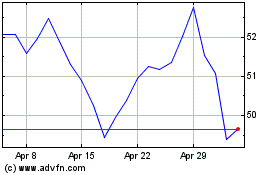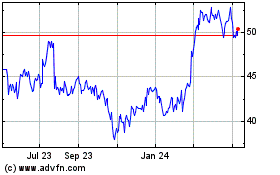PayPal Loses Big Part of eBay Business -- WSJ
February 01 2018 - 3:02AM
Dow Jones News
By Peter Rudegeair
This article is being republished as part of our daily
reproduction of WSJ.com articles that also appeared in the U.S.
print edition of The Wall Street Journal (February 1, 2018).
PayPal Holdings Inc. is losing a chunk of the business of one of
its biggest sources of customers.
eBay Inc., the marketplace website that owned PayPal until it
was spun out as a separate company in 2015, said Wednesday that it
would start managing the payments flow of buyers and sellers
transacting on its website. Adyen BV, a financial-technology
startup based in Amsterdam, will take over as eBay's primary
payments processor after its agreement with PayPal ends in
mid-2020.
"We believe that we can offer a more seamless experience while
giving buyers and sellers more choice for payment and payout
options," eBay CEO Devin Wenig said on a conference call with
analysts.
Shares in PayPal fell more than 12% in aftermarket trading,
while shares in eBay rose more than 8%.
Despite being apart for more than two years, eBay is still a
large, though declining, contributor to PayPal's business. Around
22% of PayPal's 2016 revenue came from customers on eBay's
platform, down from 26% in 2015 and 29% in 2014.
PayPal CEO Dan Schulman said on a conference call with analysts
that the loss of part of its business with eBay would be "quite
manageable" and had been assumed for some time.
"Volume is important to us but so is profitability," said John
Rainey, PayPal's finance chief, on the conference call. "Where this
was ending up is something that we weren't interested in from a
profitability perspective."
The executives added that PayPal's eBay volume was growing
slower than its non-eBay volume. They said that trend would get a
boost from recently-signed agreements for PayPal to be a payment
option at large retailers including Walt Disney Co., Dillard's Inc.
and QVC Inc. for the first time.
Mr. Schulman added that eBay users will be able to buy and sell
goods there with PayPal's digital wallet until 2023 thanks to a new
agreement the two companies signed. In an interview, he said that
the PayPal-branded checkout option was the majority, and the most
profitable, part of its business with eBay.
The announcement that eBay was backing away from its
relationship with PayPal overshadowed the payment firm's fourth
quarter results. PayPal said that profit rose 59% despite booking a
big charge related to the U.S. tax overhaul.
The San Jose, Calif.-based payments company reported a quarterly
profit of $620 million, or 50 cents a share. That compares with a
profit of $390 million, or 32 cents a share, in the same period of
2016. On an adjusted basis, PayPal's per-share earnings rose to 55
cents, above the estimate of analysts polled by Thomson
Reuters.
PayPal incurred a tax expense of $180 million because of the
"impact of the recently enacted Tax Cuts and Jobs Act of 2017,"
which brought its effective tax rate to 28.2%. In the fourth
quarter of 2016, PayPal's effective tax rate was 16.8%.
Payment volume totaled $131.45 billion, up nearly one-third from
the same period a year ago. Venmo, PayPal's mobile person-to-person
payments service, handled $10.4 billion in volume during the fourth
quarter. That was 86% more than the volume it handled in the fourth
quarter of 2016.
Expenses rose 15% to $2.9 billion thanks in part to a one-third
increase in transaction costs.
Laura Stevens contributed to this article.
Write to Peter Rudegeair at Peter.Rudegeair@wsj.com
(END) Dow Jones Newswires
February 01, 2018 02:47 ET (07:47 GMT)
Copyright (c) 2018 Dow Jones & Company, Inc.
eBay (NASDAQ:EBAY)
Historical Stock Chart
From Mar 2024 to Apr 2024

eBay (NASDAQ:EBAY)
Historical Stock Chart
From Apr 2023 to Apr 2024
